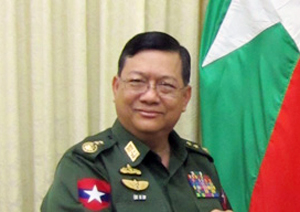Perhaps it isn’t the accurate title, because a lot of things happened during the last year that – drugwise – began on 26 June 2012, notably:
- More poppy fields were seen most of which failed to yield much
- More synthetic drugs were seized but a lot more were produced and traded
- Trial and execution of Shan Godfather Naw Kham by Chinese authorities
- Killing in a border military post that exposed official involvement in drugs
- Citizens taking initiative to do away with local drug trade and abuse
- Official decision to extend the deadline for elimination of drugs in the country from 2014 to 2019
- Government-rebel-UNODC agreement to set up joint crop substitution project
All these were taking place while the world, captivated by the reforms in Burma, was oblivious to the fact that the country was going through one of its most treacherous periods — old systems, if not gone, are taking a back seat but most of the new ones are yet to be introduced, let alone put in place.
 Just take a look at the situation on the drug front. When Lt-Gen Ko Ko, military appointed home minister, announced at the 5 October 2012 meeting in Naypyitaw, which was attended by the Central Committee for Drug Abuse Control (CCDAC), the United States’ Drug Enforcement Administration (DEA), Thailand’s Office of Narcotics Control Board (ONCB) and Australian Federal Police (AFP), that the 15 year masterplan would be extended 5 years to March 2019 “to maintain the momentum of the war on drugs” nobody was fooled.
Just take a look at the situation on the drug front. When Lt-Gen Ko Ko, military appointed home minister, announced at the 5 October 2012 meeting in Naypyitaw, which was attended by the Central Committee for Drug Abuse Control (CCDAC), the United States’ Drug Enforcement Administration (DEA), Thailand’s Office of Narcotics Control Board (ONCB) and Australian Federal Police (AFP), that the 15 year masterplan would be extended 5 years to March 2019 “to maintain the momentum of the war on drugs” nobody was fooled.
And when it was repeated at the 6 nation meeting, 6-9 May, it was merely taken as a reaffirmation of the government’s failure to deal with the problem.
The surprising thing about the meeting was that nobody was reported as asking the government what it proposed to do during the next 6 years, since the 1999-2014 plan was a manifest flop: 39 townships targeted in Shan State alone but it was found last year that 49 townships were growing poppies.
Maybe everyone was so pleased about the reforms that no one wanted to upset the atmosphere by such a sensitive question.
Or maybe being government is not an easy thing. Unlike non-state actors who can afford go straight to the root of matters anytime they want, governments seem to be spending more time trying to find an easy way out, both for themselves and fellow governments.
Like putting the blame on others, except themselves.
But if the world we know has learned something, it is that searching for an easy way out never gets one.
As the famous saying of Lao Zi goes:
“Everything easy means great difficulty
Thus for the Sage, everything is difficult,
And so in the end, nothing is difficult”
We can therefore start by asking serious questions:
- Why didn’t the 15 year masterplan work?
- Is insurgency really the root cause of drugs? Or is it rather bad government?
- Was it really poverty that led to insurgency? If so, what explains the fact that Shan State with 33% rate of poverty has the highest number of rebels and Chin state with 73% rate has the lowest number?
- And many others.
Only after we have dealt with the misconceptions, then, we will be able to tackle the problem once and for all. Or else, we are going to have another extension of the deadline by 2019.



